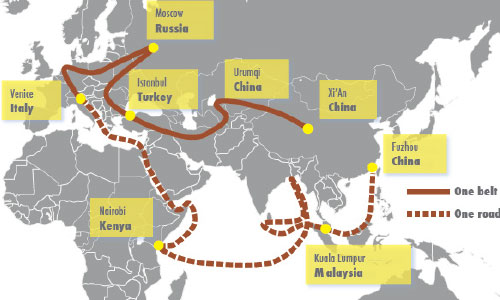DUISBURG - Suad Durakovic, a German citizen of Bosnian origin, runs a logistics company that also trains truck drivers in the western German city of Duisburg.
“We are short of truck drivers! The whole country needs more drivers,” Durakovic told Xinhua while overseeing a training course.
The booming logistics industry in the city, driven up by the Silk and Road construction, brings Durakovic real business.
“Duisburg is a logistics center. The new Silk Road is definitely a reason for the growth of logistics,” he said.
Located in the Ruhr industrial area, Duisburg is the world’s largest inland port and a hub for transportation in west Europe. As the city has become a key terminal of the freight trains from and to China, changes are taking place.
CLOSER CONNECTIONS
In Duisburg Intermodal Terminal (DIT), freight trains carry beer, wine, machinery, milk powder and auto parts to China and textiles, machinery and toys to other countries in Europe.
The freight volume involving China accounts for nearly one third of the total in DIT, which has had to hire more drivers and workers to handle the containers and build more warehouses.
Near the Duisburg Port, the German national railway company Deutsche Bahn (DB) is building another freight terminal to be put in operation this year. Nicole Brandenburg, a staff there, told Xinhua that the shipment volume in Duisburg will further increase as she expected more trains from or to China.
Duisburg Port is expanding. A deserted paper mill has been converted into new port facilities and the new container dock near the Rhein River has increased the capacity of the whole port. Through those changes, Durakovic found opportunities for his company: he will train as many as 1,000 truck drivers per year in the future instead of 400 at present.
The freight trains, named China Railway Express, is a key project under the Belt and Road Initiative proposed by China. With an average journey time of two weeks, cargo trains between Europe and China are faster than container ships and cheaper than cargo planes.
The project’s contribution to the local industry is visible, with the Railway Transportation Service Broker (RTSB) as a case. The company previously focused on transportation between West Europe and former Soviet Union states till 2013 when it operated the first train from central China’s Zhengzhou to German city of Hamburg.
As the route succeeded and attracted more customers, RTSB operated more freight trains between Duisburg and Hamburg and Chinese cities like Chengdu, Chongqing, Hefei and Changsha.
In the past three years, the turnover of the company tripled to 300 million U.S. dollars, and the freight volume doubled in 2018 from a year ago.
“It’s all because of the China Railway Express. It has become the focus of our company,” said Kateryna Negrieieva, business development director of RTSB, adding that more jobs are created in other parts of Europe as a result of increased cargo flows on the routes. In the Polish city Malaszewicze bordering Belarus, RTSB’s office expanded from five staff members in 2016 to 30 at present. (Xinhua)
Home » World » (BRF) Feature: New Silk Road Helps Revive Germany’s Rust Belt City
(BRF) Feature: New Silk Road Helps Revive Germany’s Rust Belt City

